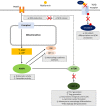Metformin and Autoimmunity: A "New Deal" of an Old Drug
- PMID: 29915588
- PMCID: PMC5994909
- DOI: 10.3389/fimmu.2018.01236
Metformin and Autoimmunity: A "New Deal" of an Old Drug
Abstract
Metformin (dimethyl biguanide) is a synthetic derivative of guanidine, isolated from the extracts of Galega officinalis, a plant with a prominent antidiabetic effect. Since its discovery more than 50 years ago, metformin represents a worldwide milestone in treatment of patients with type 2 diabetes (T2D). Recent evidence in humans indicates novel pleiotropic actions of metformin which span from its consolidated role in T2D management up to various regulatory properties, including cardio- and nephro-protection, as well as antiproliferative, antifibrotic, and antioxidant effects. These findings, together with ground-breaking studies demonstrating its ability to prolong healthspan and lifespan in mice, provided the basis for defining metformin as a potential antiaging molecule. Moreover, emerging in vivo and in vitro evidence support the novel hypothesis that metformin can exhibit immune-modulatory features. Studies suggest that metformin interferes with key immunopathological mechanisms involved in systemic autoimmune diseases, such as the T helper 17/regulatory T cell balance, germinal centers formation, autoantibodies production, macrophage polarization, cytokine synthesis, neutrophil extracellular traps release, and bone or extracellular matrix remodeling. These effects may represent a powerful contributor to antiaging and anticancer properties exerted by metformin and, from another standpoint, may open the way to assess whether metformin can be a candidate molecule for clinical trials involving patients with immune-mediated diseases. In this article, we will review the available preclinical and clinical evidence regarding the effect of metformin on individual cells of the immune system, with emphasis on immunological mechanisms related to the development and maintenance of autoimmunity and its potential relevance in treatment of autoimmune diseases.
Keywords: B cell; T cell; autoimmune diseases; autoimmunity; fibroblast; macrophage; metformin; neutrophil.
Figures

References
-
- Bailey CJ, Day C. Metformin: its botanical background. Pract Diabetes Int (2004) 21(3):115–7. 10.1002/pdi.606 - DOI
Publication types
MeSH terms
Substances
LinkOut - more resources
Full Text Sources
Other Literature Sources

